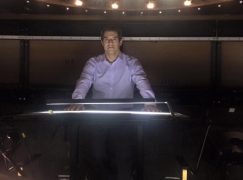We counted 1,616 orchestral composers in Latin America
mainpress release:
The conductor Miguel Harth-Bedoya has launched Latin Orchestral Music, an online resource devoted to providing a complete and comprehensive source of information about orchestral music from Latin America and the Caribbean. The catalog, which is constantly being updated, currently includes 1,616 composers from 24 countries and features a list of 9,125 works.
Harth-Bedoya, who is Music Director of the Fort Worth Symphony Orchestra and Chief Conductor of the Norwegian Radio Orchestra/Oslo, has been a longtime advocate for music from his native Latin America. Over the past two decades, he has conducted, recorded, and discovered many composers including fellow Peruvian, Jimmy Lopez and Colombian composer, Victor Agudelo. He has also championed works by less well-known composers such as Diego Luzuriaga (Ecuador), Alberto Williams (Argentina), and Alfonso Leng (Chile), among many others.






Comments